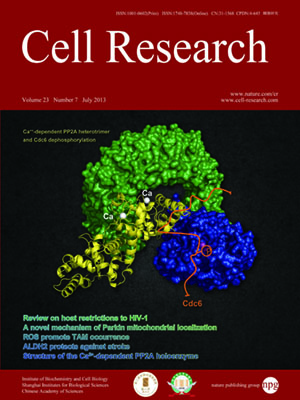
Volume 23, No 7, Jul 2013
ISSN: 1001-0602
EISSN: 1748-7838 2018
impact factor 17.848*
(Clarivate Analytics, 2019)
Volume 23 Issue 7, July 2013: 947-961
ORIGINAL ARTICLES
Regulation of APCCdh1 E3 ligase activity by the Fbw7/cyclin E signaling axis contributes to the tumor suppressor function of Fbw7
Alan W Lau1, Hiroyuki Inuzuka1, Hidefumi Fukushima1, Lixin Wan1, Pengda Liu1, Daming Gao1, Yi Sun2 and Wenyi Wei1
1Department of Pathology, Beth Israel Deaconess Medical Center, Harvard Medical School, Boston, MA 02215, USA
2Division of Radiation and Cancer Biology, Department of Radiation Oncology, University of Michigan, Ann Arbor, MI 48109, USA
Correspondence: Wenyi Wei, Tel: +01 (617)-735-2495(wwei2@bidmc.harvard.edu)
Fbw7 and Cdh1 are substrate-recognition subunits of the SCF- and APC-type E3 ubiquitin ligases, respectively. There is emerging evidence suggesting that both Fbw7 and Cdh1 function as tumor suppressors by targeting oncoproteins for destruction. Loss of Fbw7, but not Cdh1, is frequently observed in various human tumors. However, it remains largely unknown how Fbw7 mechanistically functions as a tumor suppressor and whether there is a signaling crosstalk between Fbw7 and Cdh1. Here, we report that Fbw7-deficient cells not only display elevated expression levels of SCFFbw7 substrates, including cyclin E, but also have increased expression of various APCCdh1 substrates. We further defined cyclin E as the critical signaling link by which Fbw7 governs APCCdh1 activity, as depletion of cyclin E in Fbw7-deficient cells results in decreased expression of APCCdh1 substrates to levels comparable to those in wild-type (WT) cells. Conversely, ectopic expression of cyclin E recapitulates the aberrant APCCdh1 substrate expression observed in Fbw7-deficient cells. More importantly, 4A-Cdh1 that is resistant to Cdk2/cyclin E-mediated phosphorylation, but not WT-Cdh1, reversed the elevated expression of various APCCdh1 substrates in Fbw7-deficient cells. Overexpression of 4A-Cdh1 also resulted in retarded cell growth and decreased anchorage-independent colony formation. Altogether, we have identified a novel regulatory mechanism by which Fbw7 governs Cdh1 activity in a cyclin E-dependent manner. As a result, loss of Fbw7 can lead to aberrant increase in the expression of both SCFFbw7 and APCCdh1 substrates. Our study provides a better understanding of the tumor suppressor function of Fbw7, and suggests that Cdk2/cyclin E inhibitors could serve as effective therapeutic agents for treating Fbw7-deficient tumors.
10.1038/cr.2013.67
FULL TEXT | PDF
Browse 11183


